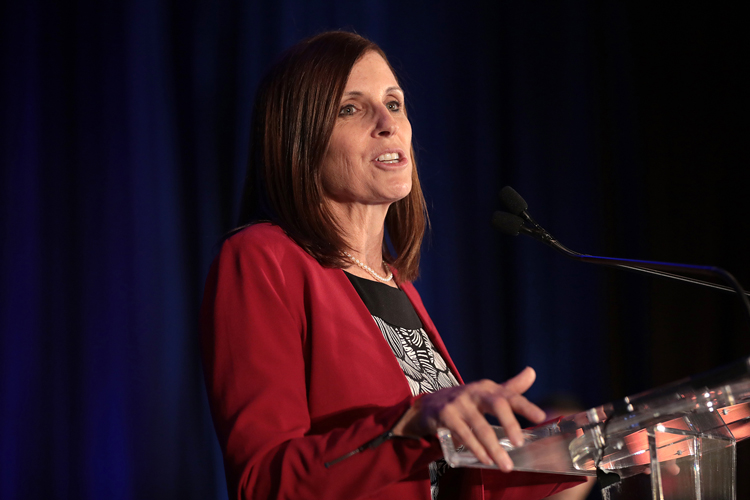Like just about everything else in the country, Valley Partnership’s monthly Friday Morning Breakfast went on hiatus as the nation dealt with the COVID-19 pandemic for the last three-plus months. On Friday, the event returned, but only virtually. Valley Partnership President and CEO Cheryl Lombard moderated a Zoom meeting panel discussion titled “COVID-19: The Future of Office in the Valley and the Nation.” The panelists were Martha dePlazaola Abbott, co-managing director of Gensler’s Phoenix office; Molly Ryan Carson, senior VP, market leader of Southwest Region for Ryan Companies US, Inc.; and Cathy Teeter, managing director of CBRE’s Phoenix office.
Also taking part in the virtual event was Senator Martha McSally, who was scheduled to be the guest speaker at the March Friday Morning Breakfast, which was canceled. McSally discussed the federal government’s response to the economic challenges that were created by the COVID-19 pandemic, namely the Coronavirus Aid, Relief, & Economic Security (CARES) Act. She said the first goal of the government’s response was speed, but “Federal government and speed are not normally in the same sentence.”
“We didn’t choose perfection and we were trying to use the existing infrastructure that was out there,” McSally said. “For example, financial institutions with the (Paycheck Protection Program) PPP. I know that was clunky and I know we heard some feedback on that. But we didn’t want everyone lining up for a government program, and in the meantime, just watching their business go under.”
McSally also stressed the fact that there is still PPP money available for businesses, even ones that have re-opened.
“There is over $120 billion left,” McSally said. “Even if you are still open again, you can access a PPP loan if you qualify. I think there is some confusion out there for some businesses that if they’re limping through right now that they can’t qualify. They can qualify.”
McSally also noted that while there is still a lot of fear and uncertainty in the country right now, Arizonans should remain mindful of the safety guidelines and lead by example.
“The virus is among us and every day is a day closer to a cure and a vaccine, but the virus is still among us,” McSally said. “So as we’re working, we’re interacting with people; we have to do it as safely as possible and follow the guidelines that have been given to ensure that we continue to protect the vulnerable through this.”
McSally also discussed the potential business opportunities that will arise from the pandemic. She said that there is greater attention being paid to bringing manufacturing back to the United States, and Arizona is poised to capitalize on that. McSally mentioned returning the manufacturing of personal protective equipment (PPE), pharmaceuticals and technology back, and, “Not relying on our adversary, China, anymore.”
“ I think that brings opportunities for us here in Arizona to attract those supply chains for a lot of these products back to America and back to Arizona.”
McSally also said there is opportunities for change in how we deliver medicine, as the country has seen a rise in the utilization of telemedicine during the pandemic.
“People are saying, ‘Why do I have to drive to a doctor’s office when you can actually use technology and get care at home?’ “ McSally noted. “So, we’re going to need to make sure there is broadband available for those that are low income or those in rural areas. We don’t want to have the digital divide leaving them behind as we’re delivering medicine or delivering education.
“We’re America. We have great entrepreneurial spirit. We have great innovation in our veins, so what can we do moving forward that can provide more job opportunities based on the disruptions that we’ve seen here.”
The three panelists during Friday’s event have definitely seen a disruption in how their offices are functioning. All three said their offices have protocols in place that limit the number of employees in the office. In the case of Teeter’s CBRE office, and Abbott’s Gensler office, all employees are still working remotely, with a few exceptions for property managers.
Abbott noted that at Gensler’s four locations in China, employees have returned to the office. For all three companies, there are no office visitors and very limited in-person meetings, as well as no travel for company business.
Teeter said that there has been a recent increase in in-person property tours, but her company has seen the value of virtual property tour. If there is an in-person tour, the number of people taking part is limited to less than six.
The pandemic came right as Gensler was getting ready to move into a new office in the Camelback Esplanade. Gensler’s last day in their old location was on May 31 and Abbott said that work on the new office isn’t completed yet, so working from home will continue for everyone until the new space is ready to go.
Abbott brought up a client survey that Gensler did that showed only 12 percent of their United States clients wanted to work from home and 70 percent said they wanted to work in the office most of the time.
“Many are anxious to get back,” Abbott said. “Younger professionals crave that camaraderie that they get on the job.”
All three panelists agreed that, at least in the near future, there will be significant changes in how many people are working in an office and how the workspaces in offices are arranged.
“A lot of our clients are looking at their office spaces and are thankful for having larger spaces that they can arrange so employees can feel safer,” Ryan Carson said.
“What we’re noticing is that it may turn into where all people can’t go into the office at all times,” Abbott said. “It may turn into a shift approach.”
The panelists also discussed the difference between the Phoenix market and other major office markets. Teeter noted that in China, approximately 70 percent of the workforce has returned to the office, but, mass transit use is only at 20 percent of what it was before the pandemic. Also, in major markets with a lot of high-rise buildings, the major concern during the time of COVID is about crowding into elevators, which makes those types of office product less attractive to companies as they try to look out for the safety of their employees.
“In Arizona, when you look at our traditional office space, a lot of our downtown buildings would be considered suburban in many other cities,” Teeter said. “We won’t likely see the impact like in cities like Shanghai.”
“I don’t think downtown Phoenix and downtown Tempe are like New York City or Boston or Los Angeles, there’s an opportunity there to look at how we enter and inhabit our office space,” Abbott added. “It seems like we’ve been living pretty much in the outdoors for the last three months, so how do you transition to having that access to daylight and the outdoors and then go back into a high rise. People are going to rethink how they go back in their building and how do they create amenities that make their tenants think a different way?”
Also noteworthy from the panel discussion was that all three panelists had a very upbeat view on the future of Arizona’s office market. All three mentioned the quality of life in the Valley, with warm weather and affordable housing. Ryan Carson said her company has been working with several companies looking to expand their operations in Arizona, or, to open an office. Teeter has seen continued interest from financial technology companies, as well as high-tech manufacturing companies who are planning to move into the Phoenix market.
“There is continued interest from California,” Teeter said. “All of those massive (industrial and manufacturing) projects all have ancillary companies that come with them. That interest is going to continue to come from other markets that don’t have the quality of life that we offer.
“Pre-COVID, Arizona fundamentals were strong. We’ve seen, just in the last few weeks, a huge uptick in inquiries and I think people are going to continue to look to Arizona. If companies are going to have a remote working policy, employees will be more mobile and what better place to be if you’re an employee than here. We have blue skies ahead in our business climate here.”




